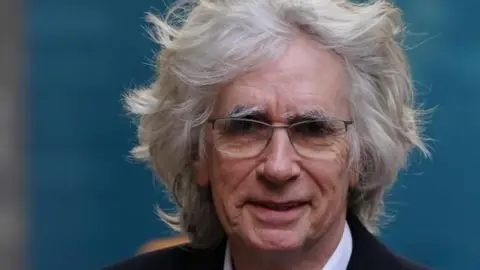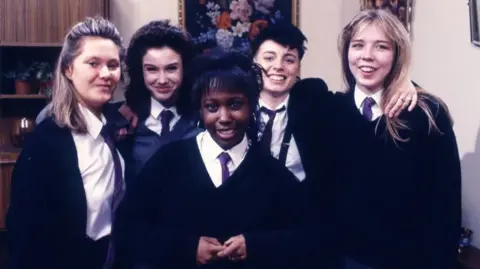Courage has gone out of broadcasting, says Grange Hill creator
 PA Media
PA MediaGrange Hill and Hollyoaks creator Sir Phil Redmond has said that modern broadcasting lacks courage, and suggested that TV watchdog rules should be broken more often.
The man behind the iconic soaps said gritty programming was important, and that there was a vacuum of such for today's youth.
Speaking to BBC Radio 4's Today programme, Sir Phil suggested social media was a major issue that needed frank exploring through television dramas.
"I think the problem is, is that the courage has gone out of broadcasting really, and there's just too much risk aversion," Sir Phil told the show's guest editor Sir Sajid Javid on Friday.
Sir Phil was joined on the programme by Chairman of Ofcom Lord Michael Grade and Grange Hill star Michelle Gayle, who respectively added mental health and misogyny to the list of topics needing realistic reflecting on television.
"There is a place for something like Grange Hill, and from my career, I always found that the harder you made the storyline, the more you upset the regulators, but the more the audience appreciated it," Sir Phil said.
Audiences live the kinds of issues explored by such programmes, he added, "and what they want to see is their own life put on screen as realistically as possible".
Lord Grade agreed with Sir Phil, and said there was "absolutely, no harm at all" in upsetting Ofcom.
"This was an amazing, amazing show. It changed television in more ways than I think people realise," he said.
Prior to Grange Hill, Lord Grade likened youth television to "the world of Enid Blyton", featuring gentle storylines.
"Then along came Grange Hill, the anxieties as you go through growing up, there it was in the raw," he said.
Grange Hill was a series that aired on the BBC from 1978 to 2008 and storied life in a London comprehensive school.
It was known for its gritty social realism, exploring racism as well as drug abuse, teenage pregnancy, mental illness and HIV and Aids.
Ms Gayle, who played student Fiona Wilson, said she was never labelled a "diversity hire", and that her character "just existed" naturally within the show.
"There was no, kind of, 'this is woke casting'," she said.
"This was a multicultural school because this is what most schools were experiencing at the time.
"It was 'never you're the black person,' or 'you're the token,' it's 'lets show what's happening right now'," she said.

Asked what issues the guests would think Grange Hill would explore if on air today, Lord Grade suggested mental health and family relationships.
"These are big stories today, and very emotionally engaging," he said.
Choosing rising prevalence of misogyny, Ms Gayle said: "I think there's a real conversation to be had around TV getting a grip, getting young boys to watch so they are outside this toxic echo chamber [of social media]."
Sir Phil said social media itself would be the issue to tackle.
"There's no counterpoint to that, and that's what Grange Hill used to offer," he said.
"It didn't matter what the issue was... Grange Hill would always offer some solution or some way to go and ask somebody about this issue, but at the end of it, it's basically, you're not on your own."
